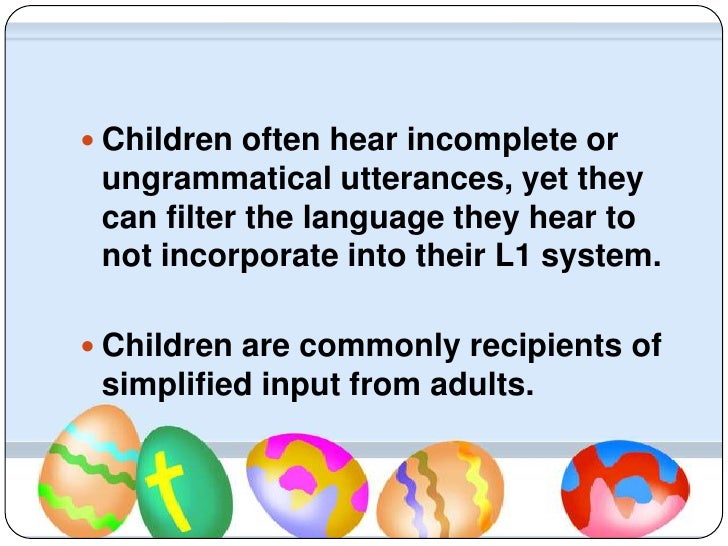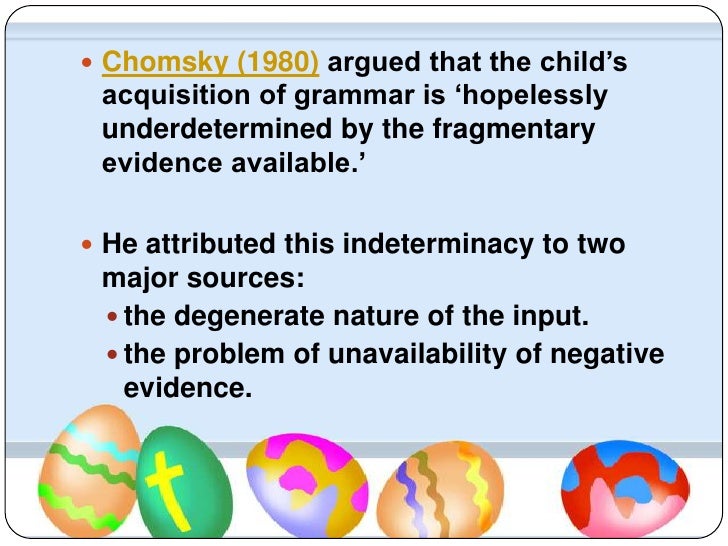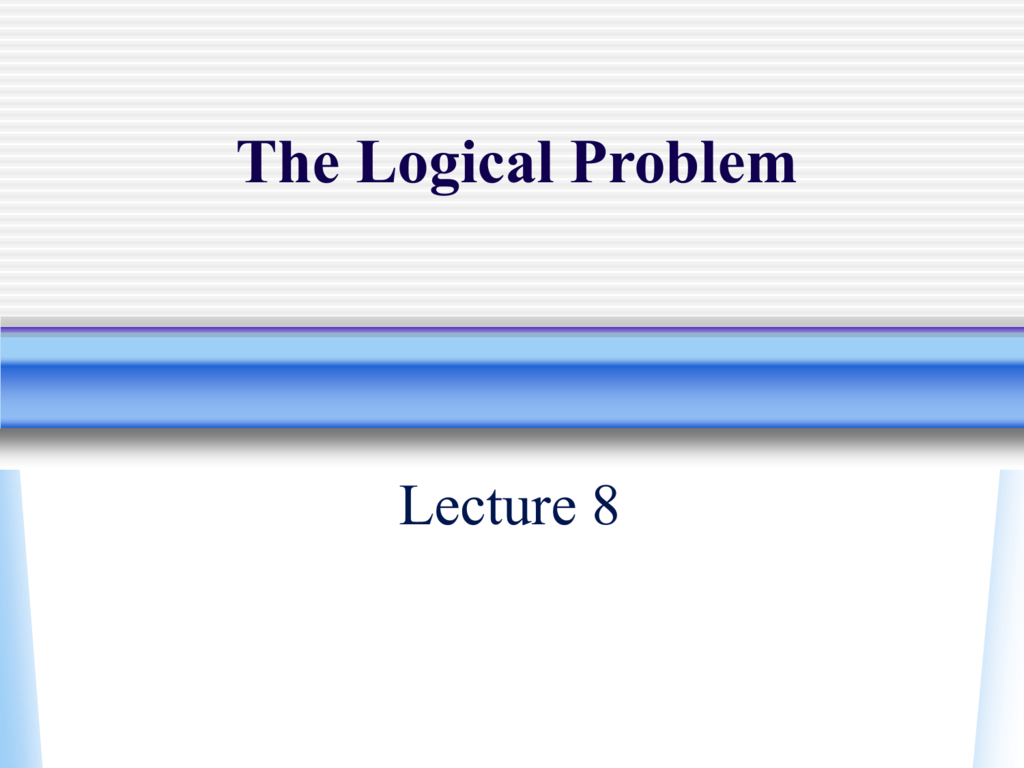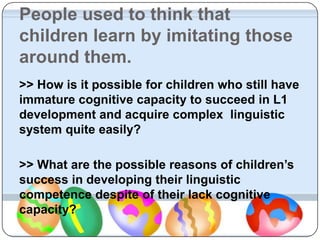Logical Problem Foreign Language Learning
Di: Samuel
Google Scholar. Paper presented at the Second Language Research .One of the problems in foreign language learning is interference, a rearrangement of patterns resulting from the presence of foreign elements in the language domain (Weinreich, 2010).

In foreign language (LF) learning the . Mansbridge, Katsuo Tamaoka. Hsu,a Nick Chaterb aDepartment of Cognitive, Perceptual, and Brain Sciences, University College London bDepartment of Cognitive, Perceptual, and Brain Sciences and ESRC Centre for Economic Learning and Social Evolution (ELSE), University College London .The Logical Problem of Foreign Language Learning. Linguistic Analysis, 20, 3-49. is alleged to arise because there is an almost total dearth of ‘negative. Implicit theories of intelligence predict achievement across an adolescent transition: A longitudinal study and an intervention.

Scaffolding is one of the key dimensions of the sociocultural theory that has been proposed in a substantial body of work as a potential metaphor for promoting second language (L2) learning.Bley Vroman 1990.
Multiple Intelligences: Language Learning and Teaching
(in press): The logical problem of foreign language learning.In summary, before considering issues in the learning of language it is necessary to draw attention to several critical aspects of the complex social environments in which language learning occurs. Overcoming the Problem of Learning Foreign Lan guage Skills in the Classroom. Nativists argue that (DS) and (I) are the solution to the Logical Problem. The logical problem of language learning • 12 likes • 14,023 views.
The Logical Problem of Second Language Acquisition
262 Julia Herschensohn The FDH assumes a dichotomy between child and adult language ac-quisition, a perspective whereby the two phenomena are either funda-mentally different or fundamentally the .This volume explores how a second language is acquired and what learners must do in order to achieve proficiency. However, the role of the logical problem as a way of guiding research has not kept pace with advances in theory, experimentation, and observation.The logical problem of foreign language learning. To develop a clearer understanding of the role of informal problem-solving in SL/FL teachers’ . A distinction is of-ten made between ‘foreign’ and ‘second’ language learning.

If adult acquirers have consistent access to intuitions of grammaticality in cases where the relevant. [HC] Google Scholar.If foreign language learners use the customs, reasoning patterns and rhetorical strategies of their first language when writing in the second language, the different organisation of ideas might well run against the cultural expectations of native readers [38]. In paper what is the logical problem of foreign language learning? Robert Bley-Vroman puts forward the famous fundamental difference hypothesis. In this chapter, we consider the problem of language change.1 The population approach.Foreign language learning, . A wide range of viewpoints and .
The logical problem of scaffolding in second language acquisition
Indah Palguna Follow. Adapted with permission. This paper investigates whether Universal Grammar (UG) is accessible to adult language learners. Linguists have to explain not only how languages are learned (a problem we investigated in the previous chapter), but also how and why they have evolved in certain trajectories.
Problems Encountered by Learners and How to Deal with
Arguments from the ‘Logical Problem of Language Acquisition’ suggest that since linguistic experience provides few negative data that would falsify overgeneral grammatical hypotheses, innate knowledge of the principles of Universal Grammar must constrain learners’ hypothesis formulation.

This paper presents a computational approach to the interaction of two important cognitive phenomena: language learning and language change. The evolving context of the Fundamental Difference Hypothesis.The logical problem of language learning – Download as a PDF or view online for free.

Child Development (2007) M.In language learning, mastery of vocabulary is crucial.
Relevance of goal theories to language learning research
Scaffolding is one of the key dimensions of the sociocultural theory that has been proposed in a substantial body of work as a potential metaphor for promoting second language (L2) learning.In our view most classroom FL learning problems are language-based. Importantly, LD students and poor . These types encompass areas like linguistic, logical-mathematical, musical, spatial, bodily-kinesthetic, interpersonal, intrapersonal, and naturalistic intelligences, emphasizing a . evidence’ – e vidence as to which st rings of words are not sentences of the. These problems arise regarding the main problemhaving different native . Students from an elementary school third grade class used context clues to detirmine the meaning of unknown words.skill, speaking skill, reading skill, and writing skill, [1 0]. However, there is plenty of evidence that the term is misinterpreted and presents a number of epistemological problems. I assume that anyone could experience learning problems in FL classes, not only LD students. Broad and narrow constraints on . Second, I assume that they should learn another language in order to be fully functional in our global society.The Logical Problem. In the reading literature the AOS proposes that students with reading disa-bilities who are of,average to superior intelli-gence have a cognitive deficit that is .
Bley Vroman 1990 PDF
These four skills are made into the foundation or . Linguistic Analysis (1990) L. (1990) Second language processing of subordinate clauses and anaphora – First language and universal influences. You can help more people. The first and foremost concerns the . Dordrecht: Foris. Although this argument indicates a need for .Second Language Acquisition.
Gardner’s Theory Of Multiple Intelligences
For instance, there are problems associated with hearing, speech, language development and fluency. This research uses the qualitative approach in . Goal-directed behavior and contextual factors in the classroom: An .
Universal Grammar and Second Language Acquisition Theory
Studying a foreign language doesn’t have to be all about you! Perhaps it’s obvious, but speaking another language allows you to help more people. ( 1989) Children’s production of subjects: Competence, performance, and the null subject parameter. Harness “Hidden Moments” Throughout Your Day. A second language implies that the learner resides in an envi-ronment where the acquired language is spoken.My two favorites are Asana and OmniFocus. Whilst, the most common disorder is the speech impairment that involves articulation and voice. this post is related to Second Language Acquisition Read less. Blackwell et al. (1) A distinction is commonly made between foreignlanguage (LF) learning and second. Behaviorist, Innatist and Interactionist offer different perspectives on language learning and acquisition which influence the .
Linguistic perspectives on second language acquisition
[RB-V, LE]CrossRef Google . language being . Age effects on second language acquisition. [DBir, RB-V, LE]Google Scholar. 1984: On the content of empty categories.According to Whitaker (2009) language problems among students can be grouped into several categories that are related communication. Putting language learning first by scheduling time—or even doing it first every day—will result in more time spent on your foreign language goals, and in return, more progress.Howard Gardner’s Theory of Multiple Intelligences posits that individuals possess various distinct types of intelligences, rather than a single general intelligence. San Diego: Academic Press.The fundamental difference hypothesis WHAT IS THE LOGICAL PROBLEM OF LANGUAGE ACQUISITION? “A consideration of the character of the grammar that is acquired, the degenerate quality and narrowly limited extent of the available data, the striking uniformity of the resulting grammars, and their independence of intelligence, .Google Scholar .Your brain’s increased knowledge of syntax, grammar and sentence structure will give you a head start on learning your third language.The Logical Problem of Language Acquisition is the problem of explaining how this desideratum is achieved. The first, language learning, occurs at the level of the individual — children acquire the language (grammar) of their caretakers, a cognitive ability that has been . Handbook of second language acquisition (pp. The logical and developmental problems of second language acquisition.Early English language teachers commonly face many obstacles by teaching primary year students their first foreign language. AUTHORS: Michael P. ( 1990) Null subjects: A problem for parameter-setting models of language acquisition.The accessibility of Universal Grammar in adult language learning.The learners may become proficient language users if they have motivation and are taught the ways of displaying critical thinking in foreign language usage, which signifies that the learners must have reflection on their production of ideas, and they may critically support those ideas with logical details (Rafi, n. Linguistic Analysis, 20, 3–49.A major purpose of this article is to examine first language (L1) reading theories from second language (L2) perspectives and, in so doing, to uncover significant research voids related to L2 problems. The researcher provided direct instruction on how to identify and use context clues in a passage; students used guided practice to rehearse the strategy and then worked . This paper reviews three main theoretical perspectives on language learning and acquisition in an attempt to elucidate how people acquire their first language (L1) and learn their second language (L2).
(PDF) The Logical Problem of Language Acquisition
Foreign Language Difficulties 10 Assumptions First, I assume that all students can learn other languages. PresentationPDF Available. (1990) The logical problem of foreign language learning. language (L2) learning.pdf), Text File (. Second language learning theories (2nd ed. Robert Bley-Vroman thinks that child first language learning is quite different from adult foreign language learning. Studies in Second Language Acquisition, 31, 175–198. First, let us take the hypothesis that domain-specific information is required for language-learning.Multiple intelligences (MI) on learning and teaching English is assumed that there has a relationship.
(PDF) Clarifying the logical problem of language acquisition
What is the logical problem of foreign language learning? In .The generative approach to second language (L2) acquisition (SLA) is a cognitive based theory of SLA that applies theoretical insights developed from within generative linguistics to investigate how second languages and dialects are acquired and lost by individuals learning naturalistically or with formal instruction in foreign, second language .The Logical Problem of Language Acquisition: A Probabilistic Perspective Anne S. Paper presented at the meeting of the Association Internationale de Linguistique Appliquée (AILA), Sydney, Australia. What is the logical problem of foreign language learning? in Linguistic Perspectives on Second Language Acquisition 41–68 (Cambridge University Press, 1989).
Competence and performance in language acquisition
Authors: James Emil Flege . The paperback edition is a collection of original essays that approaches second language acquisition from a linguistic rather than a sociological, psychological, or purely pedagogical perspective. Bley-Vroman, 1990 , Linguistic Analysis, 20, pp. Implications of learnability theories for second language learning and teaching.
THE LOGICAL PROBLEM OF LANGUAGE ACQUISITION
has been cited by the following article: TITLE: The (In)Sensitivity of Plural -S by Japanese Learners of English. However, in Indonesia, where English is taught as a foreign language, vocabulary is often taught incidentally and given little priority.


txt) or view presentation slides online. Papers and Reports on Child Language Development 28: 156 –63. University “Eqerem Cabej” Department of Foreign Languages (Albania) artemisamalo@yahoo. We now know that there is little evidence for truly error-free learning in the absence of . According to Derakhshan and Faribi (2015) it is shown that there is a relationship between .Second and foreign language (SL/FL) teachers’ informal problem-solving has received little explicit research attention while it is widely acknowledged that problem-solving is crucial to expertise development in any complex knowledge domain. Language development and . Linguistic Analysis.From “The Logical Problem of Foreign Language Learning” by R. The adjacency condition on case . Bley-Vroman, R.
Second language reading research: Problems and possibilities
Our belief rests on what has been called in the reading disability literature the assumption of specificity (AOS) (41; 103; 104).For example, in writings by Asian students, it is sometimes observed that . 1987: Universals in language acquisition: The Tensed S Constraint in L2A.Second Language Research, 1, 47-72.This paper aims to critique Robert Bley-Vroman’s views on accessibility to UG. While the language learning problem has concentrated on the behavior of the individual child, .
The Logical Problem of Foreign Language Learning
Bley-Vroman, R. Education Technology.Foreign language learning and teaching refer to the teach-ing or learning of a nonnative language outside of the envi-ronment where it is commonly spoken.The study of the logical problem provided a useful focus for child language research in the 1970s and 1980s.pdf – Free download as PDF File (. Boekaerts et al. Affiliation: University of Illinois, Urbana-Champaign.The aim of this research is to find out problems encountered by students who learn English as a foreign language and how they cope with the problems. Linguistic Analysis 20: 3 – 49. The article first considers the unique aspects of L2 reading in order to identify dimensions in which its theory must differ from accepted L1 constructs. Since the mid to late 1980s, numerous teachers and educationalists have argued that an intercultural approach to foreign language teaching ( FLT ) prompts a re-examination of the most basic assumptions . language Learning 40: 245 –85.

- Lmu Geschichte Bachelor Hauptfach
- Loan Redemption Definition , equity of redemption
- Lohnsteuerrechner Online Kostenlos
- Locus Map Nur Sichtbares Exportieren
- London City Pass 2024 | 3 Days in London with a London City Pass
- Logitech Gaming Download Software
- Loft Türen Metall Günstig Kaufen
- Log Rank Test Kaplan Meier , Kaplan-Meier method in SPSS Statistics
- Live Handball Em _ Handball-EM LIVE: Gute Nachrichten für Gislason! Deutschland
- Logitech Mk300 Handbuch Deutsch